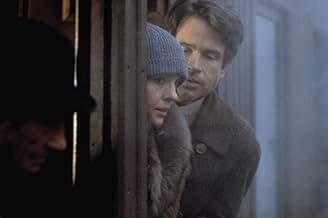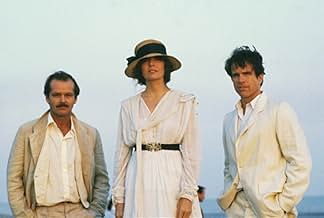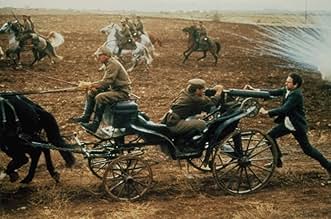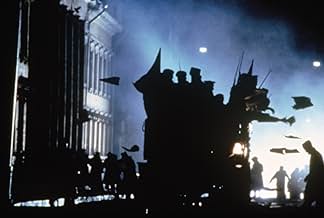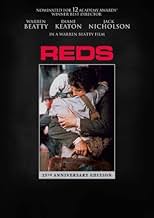Ein radikaler amerikanischer Journalist kommt mit der kommunistischen Revolution in Russland in Berührung und hofft, ihren Geist und Idealismus in die Vereinigten Staaten bringen zu können.Ein radikaler amerikanischer Journalist kommt mit der kommunistischen Revolution in Russland in Berührung und hofft, ihren Geist und Idealismus in die Vereinigten Staaten bringen zu können.Ein radikaler amerikanischer Journalist kommt mit der kommunistischen Revolution in Russland in Berührung und hofft, ihren Geist und Idealismus in die Vereinigten Staaten bringen zu können.
- Regie
- Drehbuch
- Hauptbesetzung
- 3 Oscars gewonnen
- 22 Gewinne & 37 Nominierungen insgesamt
- Mrs. Reed
- (as Eleanor D. Wilson)
Empfohlene Bewertungen
Lenin's quote came to mind when I was watching one of the most spellbinding movies to come along in years,and not since David Lean's brilliant 1965 epic classic "Doctor Zhivago" hasn't been a movie in recent memory that has come close. That motion picture is "Reds",released in 1981 by Paramount Pictures. The film was Warren Beatty's peeve project which he served not only as it star,but also the co-writer and direction. Director Warren Beatty's epic love story about American writers John Reed and Louise Bryant,set amid of the turbulence of American politics in the 1910's World War I and the Russian revolution that set this movie into plain focus. The movie itself is astounding to behold and is a tragic love story between the writers John Reed(Warren Beatty),and Louise Bryant(Diane Keaton). But it creatively used artsy,radical Greenwich Village in the 1910's-and such as real-life characters as playwright Eugene O'Neill(Jack Nicholson),and anarchist activist Emma Goldman(Maureen Stapleton)-as well as the drama of the Russian Revolution and the subsequent civil war as the principal landscapes in which their relationship plays out.
Director Beatty also made creative use of on-camera "testimony" by the likes of novelists Henry Miller and Rebecca West,Republican politician Hamilton Fish,comic George Jessel and civil libertarian Roger Baldwin. These senior citizens recall,with varying degrees of historical accuracy,Reed,Bryant and the times in which they lived. "Reds" shows convincingly that many of the contemporary issues in politics and culture have their antecendents in the first debates of the 20th century. Debates over birth control and abortion,marriage and commitment,public life versus private life,revolution versus reform are given full expression from varying viewpoints throughout the lengthy film(which runs over three hours). To Beatty's credit,his film captures the excitement the Bolshevik revolution stirred,both inside and outside Russia while revealing how the Bolshevik leadership quickly began to suppressing dissent within the revolutionary ranks on the way to becoming a dictatorship with a country that is in constant turmoil. Beatty's efforts certainly paid off artistically,bringing him prestige to him and Paramount making "Reds" a huge box office success for the studio when it premiered in theatres around Christmas of 1981.
"Reds" became one of the top highest grossing pictures of that year,and it paid off in high standards too. "Reds",which received 12 Academy Award nominations including Best Picture,lost an upset to Hugh Hudson's "Chariots Of Fire" in the Best Picture category. However it won three Oscars for Best Director(Warren Beatty),Best Supporting Actress(Maureen Stapleton),and Best Cimematopgraphy(Vittorio Storaro). Eventually,"Reds" made more than $40 million at the domestic box office,and once international figures were added in,it became one of the top grossing films of the 1980's. A feat Warren Beatty is still proud of to this day.
Reds's greatest virtue may be that it's grand, without being pompous, film-making. It's a film that takes some pride in being big and turbulent and unruly. It's important, but it's not tidy. It's in part certainly very much about ideology, but it avoids sharp, well-honed edges or large hard-etched "points." John Reed (played by the film's impresario, its sole producer, director, co-author, and star, Warren Beatty) was a man who happened to be able to write a first-hand account of the Bolshevik revolution, a long-time bestseller called Ten Days That Shook the World. At that time early in the twentieth century in America Reed arguably was a central figure, if only in the sense that during his time in Greenwich Village he managed to be (as he wanted to be) consistently at the center of things American political and cultural when he wasn't in Russia (which was pretty central then too). Roger Ebert thinks the movie "never succeeds in convincing us that the feuds between the American socialist parties were much more than personality conflict and ego-bruisings" (that may depend on how hard we need to be convinced to begin with), but we do care about Reds (Ebert thinks) as "a traditional Hollywood romantic epic, a love story written on the canvas of history, as they used to say in the ads it is the thinking man's Doctor Zhivago, told from the other side, of course." What about the choice of Warren Beatty and Diane Keaton as the lovers? Initially that may seem an odd and chemistry-poor decision. (I'm not sure I overcome that impression.) But arguably the film takes long enough with each of its main characters to make them into rounded people, complex enough to be attractive to others and to each other. Beatty uses the romance to hold the story together, and in doing so, he follows a conventional enough scheme. Reds stands out from other American mainstream products and for all its maverick central force, it remains that in its attempt to deal seriously with complex socio-political events during a turbulent period, and to approach them in an open-minded way. Beatty weaves other significant characters into the fabric of his drama, notably the leftist activist Emma Goldman (Maureen Stapleton, who got the Oscar for Best Supporting Actress) and the radical editor Max Eastman (Edward Herrmann), who are members of the same political-intellectual salon into which he brings Louise, as is the playwright Eugene O'Neill (Jack Nicholson).
Beatty's filmic recreation of John Reed is good in not being too serious or too idealized: in having a silly side Beatty's Reed perhaps has something of himself. Reed's lover Louise Bryant (Keaton), though originally a bourgeois lady from Portland, is similarly rounded; she's led by her relationship to Reed to develop other facets and strengths, and further enlarged as a personality through the way the film depicts her long affair with the alcoholic O'Neill, played by a toned-down but emotionally potent Nicholson. His discontent and negative energy are disturbing. Personalities anchor the film; but in some of the political debates and adventures one loses track and forgets why Reed is somewhere in Russia. He is at the center of things. But why he is where he is otherwise at certain moments is uncertain. In its ambition to keep juggling the many balls of major personalities and major political currents and historical events, Reds loses some of its narrative clarity and momentum over time. Complex political and historical currents are tracked, but the emotional trajectory loses its momentum. Nonetheless the film develops sweep in its length of three and a quarter hours. One walks out convinced that the material was complex enough to be worthy of such length, even if Beatty and his co-writer Trevor Griffiths could not whip it all into shape.
Whether it's all worth it on the stage of international cinema or not, this is a film of historical interest as a great independent project, begun logically in the Seventies, but completed right in the middle of Hollywood by an American intelligent and engaged enough to be star, director, writer, and producer, to raise $35 million to do it, and to make more or less the movie he wanted to make right in the middle, so to speak, of a wave of conservatism and yuppiedom, in the early Eighties, when people were thinking about making money and making it, when Ronald Reagon was President of the United States. What more appropriate time to reexamine this achievement than in the middle of the second term of George Bush II? No doubt Beatty took on this story because he was interested in a time in America when it was rife with left-wing politics. But he is realistic, and he made a Hollywood movie, with big stars and romance. And that's what it is and remains. But one can't imagine anybody else making it, and that's what makes it worth revisiting. Warren Beatty is an admirable maverick in the clone-heavy world of Southern California media-moguldom. He's a real person. And this is his great performance as a person and as an artist. I first saw it with a group of real communists. "We're "reds," they said as we walked out. The theater staff looked impressed. I was bowled over by their pride. Not everyone watches this film as a "traditional Hollywood romantic epic." It would never have been made if that were all it was. Its grandeur and ambition are still moving and it must not be forgotten. For a more pungent treatment of a political and social theme starring Beatty, consider Hal Ashby's 1975 Shampoo.
So this is basically the story of John Reed and Louise Bryant, two left-wing writers and activists whose affair and marriage only lasted five years, ending with his death in Russia in 1920, but covering some incredibly important American and world history. Bryant first meets Reed when he speaks at the Liberal Club in Portland, Oregon. She's pretentious - denying that she's married or even believes in marriage - as she and Reed have an all-night discussion of writing and politics - and nothing else - at her studio around the corner. When they encounter each other by chance some days later, surrounded by people who know them both, the truth comes out in an extended meet cute encounter that Bryant is married to a dentist and living a bourgeoisie lifestyle. But she is dissatisfied and wants more.
At Reed's invitation, Bryant follows Reed back to New York City and moves into his apartment. But at first she isn't respected when she's cross examined by Reed's highbrow circle of radical friends, asked what she does, and she says she writes about "everything". The couple fights, makes up, engages in socialist politics and activism, and are separated for long periods of time, usually because Reed is galivanting about the country writing about this or that. Ultimately, the Czar is overthrown in Russia and the pair go there when it looks like the Bolsheviks will overthrow the provisional government instituted after the downfall of the Czar.
It's downhill from there for our socialist couple, because it is at this point they encounter the tired but true old saying that absolute power corrupts absolutely. Back in the United States, energized by what has happened in Russia, the Socialist Party fractures into a conventional and Communist wing, and then the Communist wing fractures yet again, largely over the issue of control. When Reed returns to Russia after the Communists have had a chance to consolidate power, he finds them to have become dogmatic and are censoring what he is allowed to say when speaking to crowds. He dies young and disillusioned in a Russian hospital.
Technically this was for sure a great accomplishment. It does a good job of drawing you into the time and place it is set. I felt like I was experiencing these important events myself rather than just watching them be recreated onscreen. The witnesses add some context, although I wish I knew more about them. I remember at the time wondering when these conversations were recorded, because in 1981 they would have had to be over 90 to have known either Reed or Bryant. The love story is convincing although the couple spends long periods of time apart.
I'd recommend it, but realize it is not for the faint of heart or those short in attention span.
The film also sort of puts forward the question, "What if, instead of running back to Russia (to die of kidney failure and mistreatment by the CP), Jack Reed had stayed in this country to build the CP? Would it have turned out to become Stalinist?" According to Howe and Coser, who wrote a good book on THE AMERICAN COMMUNIST PARTY, much like Rosa Luxemburg and Karl Liebknecht in Germany, Reed was the ONLY leader who was independent, who had some real backbone.
The best part of the movie is when Emma Goldmann, played by Maureen Stapleton, tells Jack that "it doesn't work" (i.e. statist, bureaucratic socialism that the Bolsheviks were instituting as a grossly mistaken response to the economic crisis and Allied invasion of Russia after the Revolution). And then his rebellion against the lying propaganda of Zinoviev. Kind of hits me right now that Jerzy Kosinski should play Zinoviev--didn't he commit suicide when he was exposed as a plagiarist? Where is the line between art and reality, politics and life?
Of course I loved the romantic reality between Beatty, Bryant, and Nicholson (Reed, Bryant, and Eugene O'Neill). And the cynicism that Reed expresses about the Democrats and Wilson is certainly apropos today.
Wusstest du schon
- WissenswertesReportedly, Warren Beatty reshot some scenes up to 35 times. Paul Sorvino said he did as many as 70 takes for one scene, and Maureen Stapleton said she did as many as 80 takes for another. Reportedly, of this, she famously once said to Warren Beatty, "Are you out of your fucking mind?" This earned her a round of applause from the crew.
- PatzerThe Finnish doctor tells Reed that his blood pressure is too high, but at that time, hypertension was not considered a problem by most doctors, who did not even consider treating it. Not until the mid-'40s did doctors begin to understand the dangers of high blood pressure.
- Zitate
Eugene O'Neill: If you were mine, I wouldn't share you with anybody or anything. It'd be just you and me. We'd be the center of it all. I know it would feel a lot more like love than being left alone with your work.
- Crazy CreditsAs the credits roll, additional interviews with the 'witnesses' play.
- Alternative VersionenThree seconds of horse falls were cut from the British version. The DVD supplements showing these shots are also cut in England.
- VerbindungenFeatured in Sneak Previews: Rollover, Quartet, My Dinner with Andre, Reds (1981)
- SoundtracksYou're a Grand Old Flag
Written by George M. Cohan
Top-Auswahl
- How long is Reds?Powered by Alexa
- Who is the singer of "I Don't Wanna Play in Your Yard?"
Details
- Erscheinungsdatum
- Herkunftsland
- Sprachen
- Auch bekannt als
- Reds
- Drehorte
- Senate Square, Helsinki, Finnland(on location)
- Produktionsfirmen
- Weitere beteiligte Unternehmen bei IMDbPro anzeigen
Box Office
- Budget
- 32.000.000 $ (geschätzt)
- Bruttoertrag in den USA und Kanada
- 40.382.659 $
- Eröffnungswochenende in den USA und in Kanada
- 2.325.029 $
- 6. Dez. 1981
- Weltweiter Bruttoertrag
- 40.382.788 $
Zu dieser Seite beitragen



